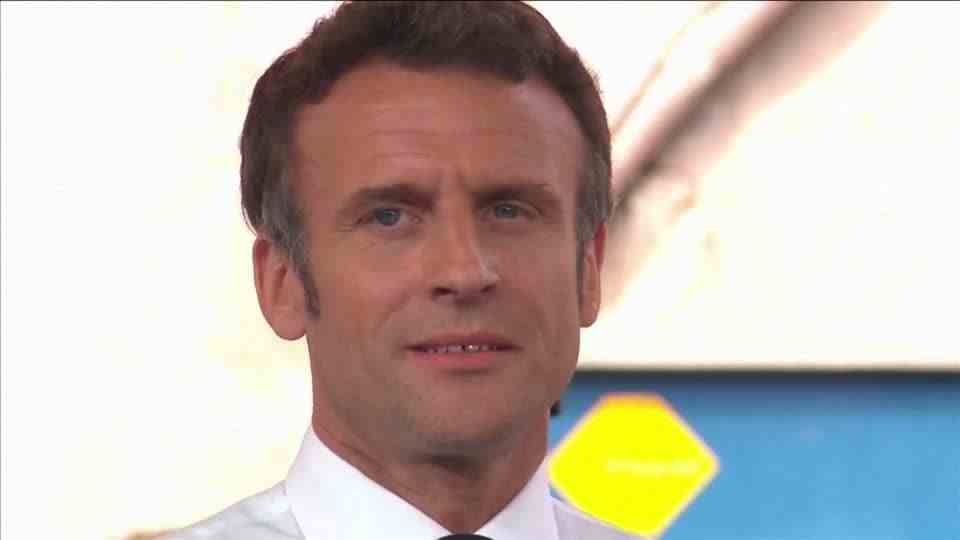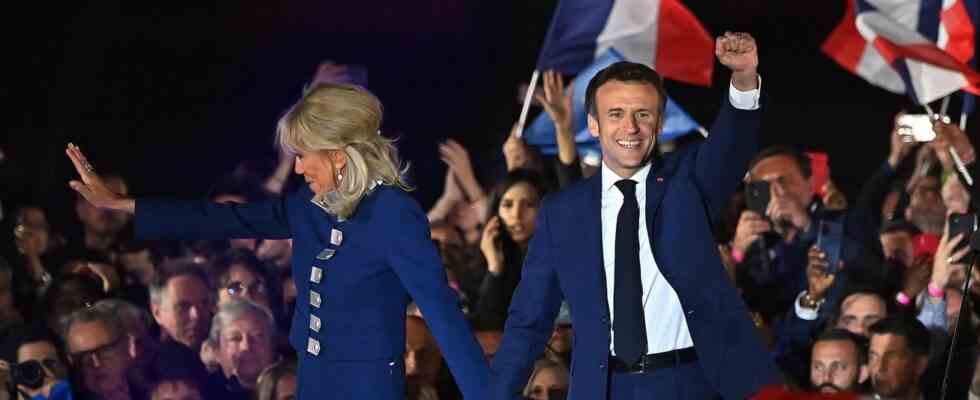FAQ
Runoff election in France
There is no political tremor – and Macron is humble
Emmanuel Macron, President of France, celebrates with his supporters in front of the Eiffel Tower.
© Rafael Yaghobzadeh/AP/DPA
There was no shock à la Brexit or the election of ex-US President Trump. French President Macron wins a runoff election against EU skeptic Le Pen. But a glorious triumph looks different.
Continuity in France, a sigh of relief in Europe: the French have rejected the nationalist and EU skeptic Marine Le Pen and re-elected the Europe friend Emmanuel Macron as their president. A political earthquake feared in Brussels and Berlin, which would have triggered Le Pen’s election victory, did not materialize. But the right-wing achieved a historically good result for their political family – and Macron was humble. The runoff election, like the first ballot before it, revealed how deeply divided French society is. At the end of election day on Sunday, the focus was already on the parliamentary elections in June.
How did the election go?
The clear winner is incumbent Emmanuel Macron. According to the Ministry of the Interior, the 44-year-old prevailed against his challenger Le Pen with 58.55 percent after all votes were counted. The 53-year-old came to 41.45 percent. Le Pen thus improved her election result from the last duel against Macron in 2017 by almost 8 percentage points. Five years ago, she received almost 33.9 percent of the votes. Voter turnout was reported to be 72 percent, slightly lower than five years ago (74.56 percent).
Why was Macron able to prevail?
Macron’s victory is by no means to be understood as an unqualified confirmation. While Le Pen called the result a “radiant victory”, Macron was humbled: “I know that many of our fellow citizens voted for me today to prevent the ideas of the far-right and not to support mine.” Referring to Le Pen voters, he said: “The anger and dissent that led them to vote for this project must also find an answer.”
However, this traditional “Republican front” against the right was less pronounced than it was in 2017. Observers assume that Macron’s pro-business course during his five-year term in office completely alienated some, especially left-wing voters.
At the same time, Macron is likely to have played his office bonus into the cards. In recent months he has been able to appear on the international stage as a mediator in the Ukraine war and as a crisis manager. In uncertain times because of Russia’s war of aggression, the corona pandemic and climate change, many Macron voters promised themselves continuity and stability above all.
Last but not least, Macron also benefited from the weaknesses of his challenger. Experts continue to classify her political attitudes as radical, although she relied on an image change and a strategy of “devilation” during the election campaign. Her closeness to Russia, which she had previously openly displayed, was also interpreted negatively. In the important TV debate four days before the runoff election, she also seemed less convincing to viewers than Macron, as polls have shown.
What does the election result mean for Germany and the EU?
There is great relief in Brussels and Berlin, congratulations from top German politicians and EU leaders came on Sunday evening. Because Macron promises continued close cooperation. And he is open to further deepening the European Union.

As president, Le Pen would have run a contrasting program. She wanted to break away from the close cooperation with Germany that had been going on for decades. A confrontation course to the EU would have been programmed. For example, she wanted to place national law above EU law and discriminate against foreigners in France. She could have slowed down a number of projects in Brussels out of self-interest. She is hostile to NATO, for example she wanted to remove France from the command structure of the western defense alliance.
Instead of continuing to rely on the hitherto influential Paris-Berlin tandem, Le Pen would have turned more to the EU-sceptical governments in Warsaw and Budapest. Another concern was that the West’s hitherto closed front against Russia was beginning to crumble.
What’s next?
It is common in France for the prime minister to offer the resignation of the government before the re-elected or new president officially takes office. The current Prime Minister Jean Castex has already announced his resignation for shortly after the election. Macron will probably be able to quickly appoint a new head of government. The online medium “Politico” assumes that a new government could be inaugurated by mid-May at the latest.
On Sunday evening, the focus shifted to the parliamentary elections, which are due in June. These are significant because while the French head of state wields a great deal of power, his influence is shrinking without a majority in the Assemblée Nationale. Without parliamentary backing, Macron would be forced to appoint a government made up of politicians from a different political camp. Such a dichotomy of executive power is referred to as “cohabitation”. The prime minister then becomes much more important.
Unlike in the run-off election, Macron will not be able to rely on the support of left-wing parties and the conservatives in the fight for seats in parliament. They pursue their own interests. Left-wing politician Jean-Luc Mélenchon, for example, who came third in the presidential elections, hopes to become prime minister if the left wins the elections. He told his supporters they could still beat Macron in the general election.

